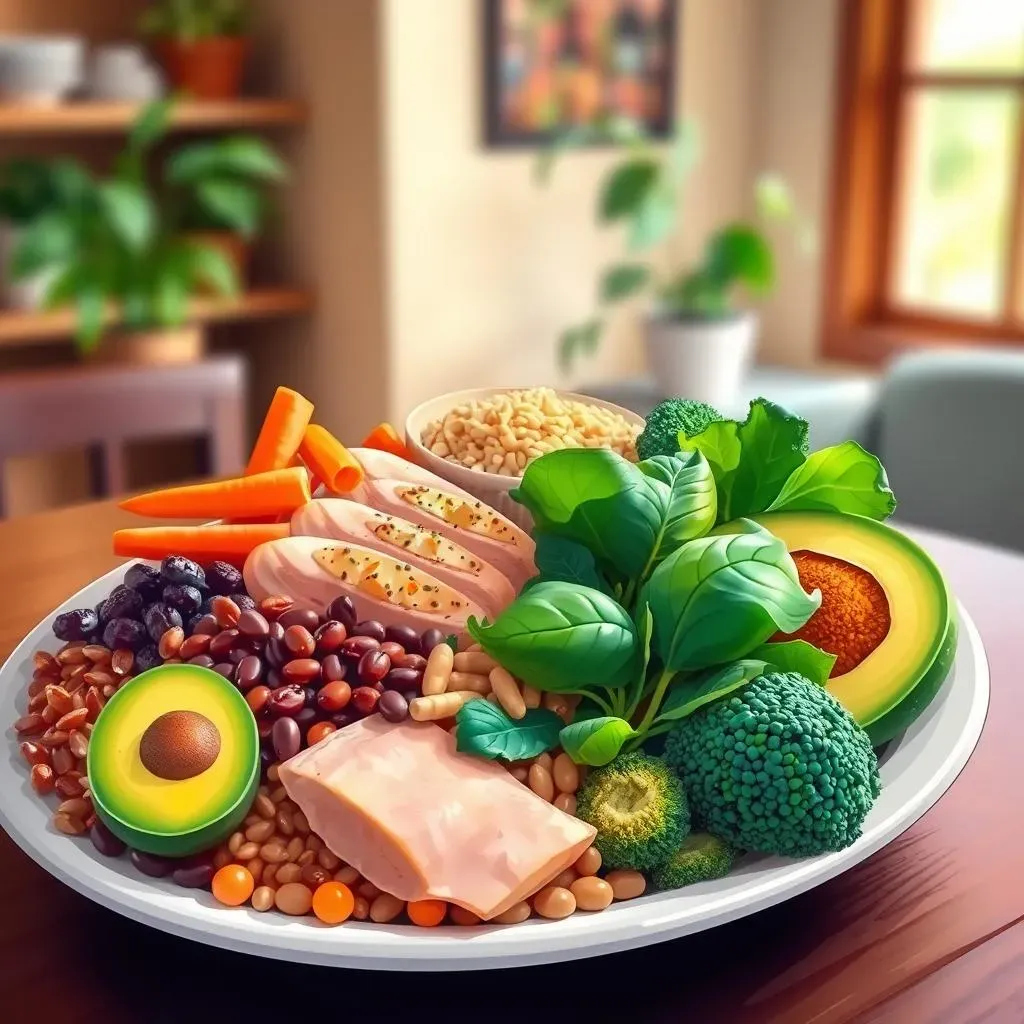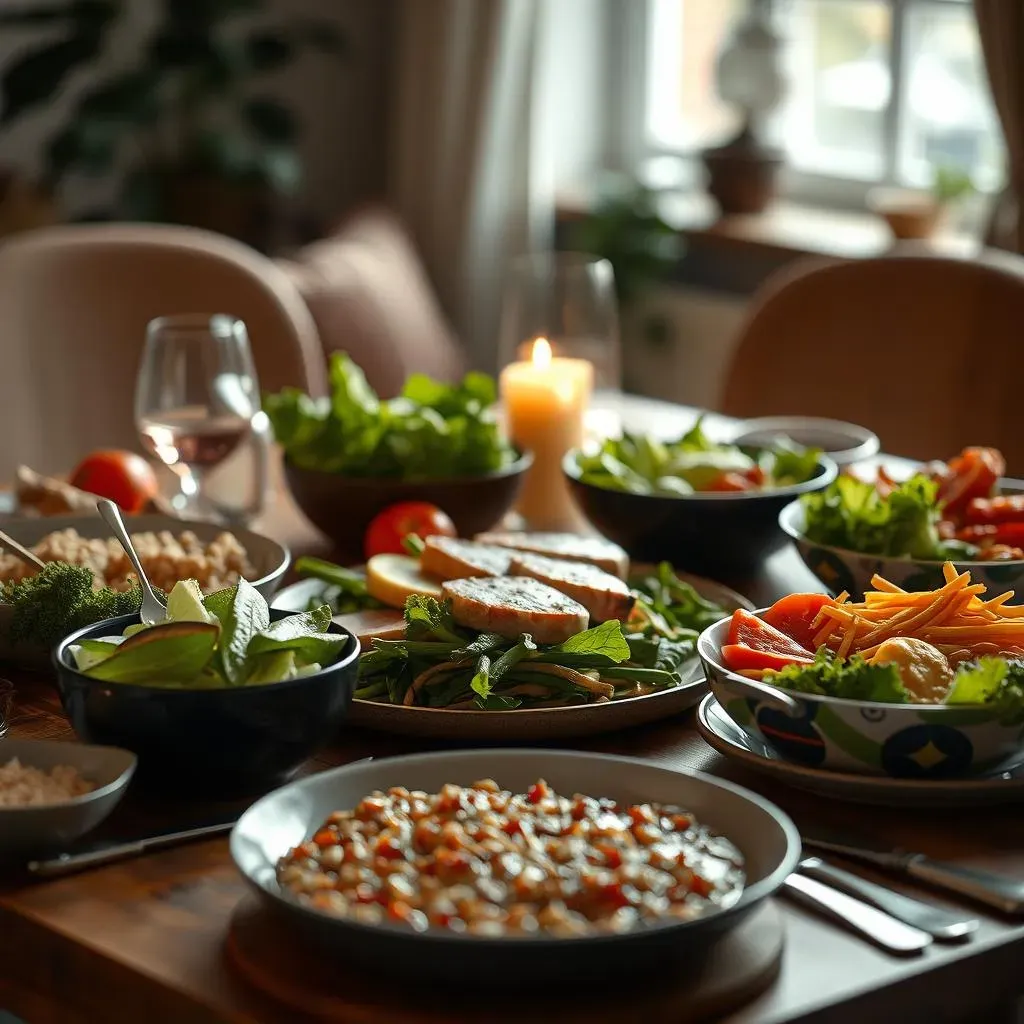Table of Contents
Ever stare into your fridge at dinnertime, wondering what even counts as a "healthy" meal? It's a question we all grapple with, and the answer isn't as complicated as you might think. This article will guide you through the essentials of what is considered a healthy dinner, breaking it down into simple, actionable steps. We'll explore the key components of a nutritious meal, from proteins and veggies to grains and healthy fats. You'll learn how to plan your meals, develop better eating habits, and even navigate the tricky terrain of eating out. Forget strict diets and calorie counting; we're focusing on creating a balanced approach that works for your life. Get ready to discover how easy and enjoyable a healthy dinner can be, and start making informed choices that nourish your body and soul.
Building Blocks of a Nutritious Dinner

Building Blocks of a Nutritious Dinner
The Protein Powerhouse
Let’s kick things off with protein, the superstar of any healthy dinner. Think of protein as the building blocks for your body, it helps you grow, repair, and feel full. It's not just about huge steaks; it can be anything from lean chicken, fish, or beans and lentils for a plant-based option. Don't be afraid to mix it up and find what you enjoy the most. I remember when I first started paying attention to protein, I was surprised by how many sources there were. It's not just meat, and that's awesome.
Sometimes people get stuck on chicken or beef, and they forget how many other choices are out there. Adding different types of protein makes meals more exciting and boosts your overall health.
Veggies: The Colorful Crew
Next up are the veggies, the colorful crew that brings vitamins, minerals, and fiber to the party. They're not just there to make your plate look pretty; they play a huge role in keeping you healthy. Aim for a variety of colors because each color represents different nutrients. A mix of greens, reds, yellows, and oranges will do wonders for your body. I used to think veggies were boring, but then I started roasting them with a little olive oil and some spices – game changer! They become so tasty.
It's like they transform into something completely different, and I actually crave them now.
Nutrient | Food Source | Benefit |
|---|---|---|
Protein | Chicken, fish, beans, lentils | Muscle repair, fullness |
Fiber | Broccoli, carrots, spinach | Digestion, heart health |
Healthy Fats | Avocado, olive oil, nuts | Brain function, nutrient absorption |
Grains, Fruits and a little bit of Dairy
Now, let’s talk about grains, fruits, and a little bit of dairy or alternatives. Whole grains like brown rice, quinoa, and whole-wheat bread provide you with sustained energy, unlike their refined counterparts. Fruits can add natural sweetness and more nutrients. A small serving of dairy, like a glass of milk or a bit of yogurt, can round things out with calcium and other important nutrients. I've found that having a small portion of each of these helps me feel satisfied without feeling overly full. It's all about balance, right?
It's like creating a symphony of flavors and nutrients on your plate, each part playing its own unique role.
Planning for Healthy Dinners and Good Habits

Planning for Healthy Dinners and Good Habits
so we've got the building blocks, right? Now, let's talk about planning, because a healthy dinner doesn't just magically appear. It's like setting up a treasure hunt for your taste buds. Start by picking a few recipes that sound yummy and fit your schedule. Don't go for anything too complicated, especially if you're new to cooking. Create a shopping list based on those recipes so you don't end up with a bunch of random ingredients. I used to just wing it, and it always ended up with me eating cereal for dinner. Trust me, planning makes a huge difference.
It's about being a little bit strategic, like you're plotting the best possible outcome for your evening meal. Having a plan takes away the stress of "what am I going to eat?" and makes it easier to stick to your healthy goals. And don’t forget to listen to your body. Eat when you're hungry, not just because it's "dinner time," and stop when you’re satisfied. It's about respecting your hunger and fullness cues.
Planning Step | How to Do It |
|---|---|
Choose Recipes | Pick a few simple recipes you like |
Make a List | Create a shopping list based on the recipes |
Listen to Your Body | Eat when you're hungry and stop when full |
Smart Choices for Eating Out and Healthy Eating

Smart Choices for Eating Out and Healthy Eating
Navigating the Restaurant Maze
so eating at home is great, but let's be real, sometimes you just want to go out, right? Eating out doesn't have to be a total health disaster, though. It's all about making smart choices. Look for places that offer grilled or baked options instead of fried. I always try to check out the menu online beforehand, so I'm not tempted by the first thing I see when I get there. It’s like planning a mini-adventure, but instead of a map, you have a menu.
And, seriously, don't be afraid to ask for modifications, like extra veggies or a sauce on the side. Most places are happy to accommodate, and it makes a huge difference to your meal.
Portion Control and Mindful Ordering
Portion sizes at restaurants can be HUGE. It’s like they're trying to feed a whole family with one plate! So, consider sharing an entree with a friend, or ask for a to-go box when you order and pack half of your meal right away. It's a simple trick, but it really works. Also, try to be mindful of what you’re ordering. Instead of going for the cheeseburger and fries every time, maybe try a salad with grilled chicken or a veggie-packed bowl. It's about balancing what you want with what your body needs. I know it can be hard when you are hungry and surrounded by delicious smells, but a little bit of planning goes a long way.
It’s like being a savvy detective, figuring out how to enjoy your meal without going overboard.
Smart Choice | Why It Helps |
|---|---|
Grilled or baked options | Less fat and calories than fried food |
Share an entree | Controls portion sizes |
Ask for modifications | Tailors the meal to your preferences |
The Social Aspect of Eating Out
Eating out is often a social thing, and it's important to enjoy the experience without feeling guilty. Don't let healthy eating stress you out. It's okay to indulge a little bit sometimes, just don't make it an everyday habit. Focus on enjoying the company and the conversation, and make healthy choices when you can. It’s all about finding a balance that works for you. I've learned that the best meals are the ones shared with friends and family, and they don't have to be perfect to be enjoyable.
It’s like being a host at your own dinner party, making sure that everyone, including you, has a good time.
Making Healthy Dinners a Part of Your Life

Making Healthy Dinners a Part of Your Life
Small Steps, Big Impact
so you've got the basics down, right? Now, it's about making this a lifestyle, not just a short-term thing. Don't try to change everything at once. It's like trying to learn a new language; you wouldn't start with Shakespeare, would you? Start with one small change, like adding an extra serving of veggies to your dinner each night, or swapping out sugary drinks for water. Once that feels comfortable, add another small change. It's like building a tower, brick by brick, not all at once. I remember trying to overhaul my entire diet, and it was exhausting. Small steps are the way to go.
It's much easier to stick with changes when they're manageable and don't feel like a huge sacrifice. Think of it as a gentle nudge toward a healthier you, rather than a complete overhaul.
Be Kind to Yourself and Stay Consistent
Look, there will be days when you just want pizza, and that's totally okay. Don’t beat yourself up over it. It's about progress, not perfection. Consistency is more important than being perfect all the time. If you slip up one day, just get back on track the next. It's like learning to ride a bike; you might fall a few times, but you get back up and keep trying. I used to get so discouraged when I had a "bad" meal, but now I just see it as a small bump in the road. It’s a journey, not a sprint.
So, be kind to yourself, celebrate your small victories, and keep making those positive choices. It's all about creating a sustainable routine that fits into your life, not the other way around.
Habit | Why It Matters |
|---|---|
Small Changes | Easier to stick with long-term |
Consistency | Builds a sustainable routine |
Self-Kindness | Avoids discouragement and burnout |
Wrapping Up: Your Path to Healthy Dinners
So, what is considered a healthy dinner? It's not about perfection, but about balance, variety, and listening to your body. It's about making choices that fuel you well and make you feel good, most of the time. By focusing on whole foods, planning ahead, and being mindful of your eating habits, you can create a sustainable approach to healthy dinners. Remember, it's okay to enjoy a treat now and then, it's about making consistent choices that lead to a healthier you. Now it's your turn to take these tips and make your next dinner a step towards a healthier and happier lifestyle.